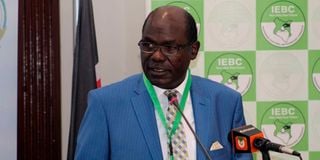Premium
Cash crisis could cripple IEBC’s election plans

Mr Wafula Chebukati, the chairman of the Independent Electoral and Boundaries Commission (IEBC).
MPs have summoned Independent Electoral and Boundaries Commission (IEBC) managers as a cash crisis threatens to cripple preparations for the 2022 General Election.
Kieni MP Kanini Kega, who chairs the National Assembly’s Budget and Appropriations Committee, said they were to meet IEBC officials yesterday but its chairman, Mr Wafula Chebukati, requested for more time.
“It’s our mandate to ensure the commission conducts a credible election through adequate funding. Their duty is to tell us how they are going to spend the money by breaking it down to the last cent,” said Mr Kega.
The commission had lamented over lack of funds for Enhanced Continuous Voter Registration (ECVR).
The High Court had on Monday directed IEBC to extend the exercise by a week after it ended on November 4.
Mr Kega said any funds come with responsibilities, saying the commission must demonstrate prudent use of resources.
The ECVR exercise cost Sh1.28 billion in wages for temporary poll clerks, logistics and direct expenses to suppliers, among others.
This averages Sh42.73 million a day, which the commission requires to register Kenyans for any extended period. The vice-chair, Ms Juliana Cherera, said they don’t have such cash.
IEBC had tabled a Sh40.23 billion budget for the August 9, 2022 General Election, set to be one of the most expensive and competitive in history.
They also asked for an additional Sh588 million in Covid-19 prevention measures during the election.
However, the commission was only allocated Sh26.34 billion, an amount that was appropriated by the National Assembly on June 15, leaving a deficit of Sh15 billion.
Governance expert Barasa Nyukuri warned that unless Parliament allocates more funds, IEBC will either accumulate massive bills or ignore important functions.
“Parliament has a duty to ensure IEBC is well funded. They should not just be motivated about allocating themselves CDF funds,” he said.
There seems to be a misunderstanding between Parliament and IEBC in preparations for the polls.
A year to the 2017 elections, the 11th Parliament summoned a stakeholders’ meeting on poll preparedness. They included the Treasury, Office of the Attorney-General, and the Ministries of Interior and ICT.
In the meeting, each stakeholder was asked to propose areas that required either financial, legal, policy or administrative intervention to ensure a credible process.
The Treasury was directed to ensure the commission was adequately funded. The Office of the Attorney-General and IEBC were to come up with electoral reforms.
The Interior ministry was tasked with security while ICT was in charge of electoral infrastructure.
This led to the formulation of the Electoral Laws (Amendment) Bill 2016, which proposed minimum reforms through a committee that was chaired by then-Meru Senator Kiraitu Murungi and Siaya’s James Orengo.
But things are different this time round. With less than 10 months to the 2022 polls, Parliament remains mum. Mr Nyukuri said IEBC and Parliament should stop trading barbs and “engage constructively”.
“This is a process where everyone comes in with their stakes. Instead of MPs and IEBC quarreling in the media, they should talk to each other,” he offered.





